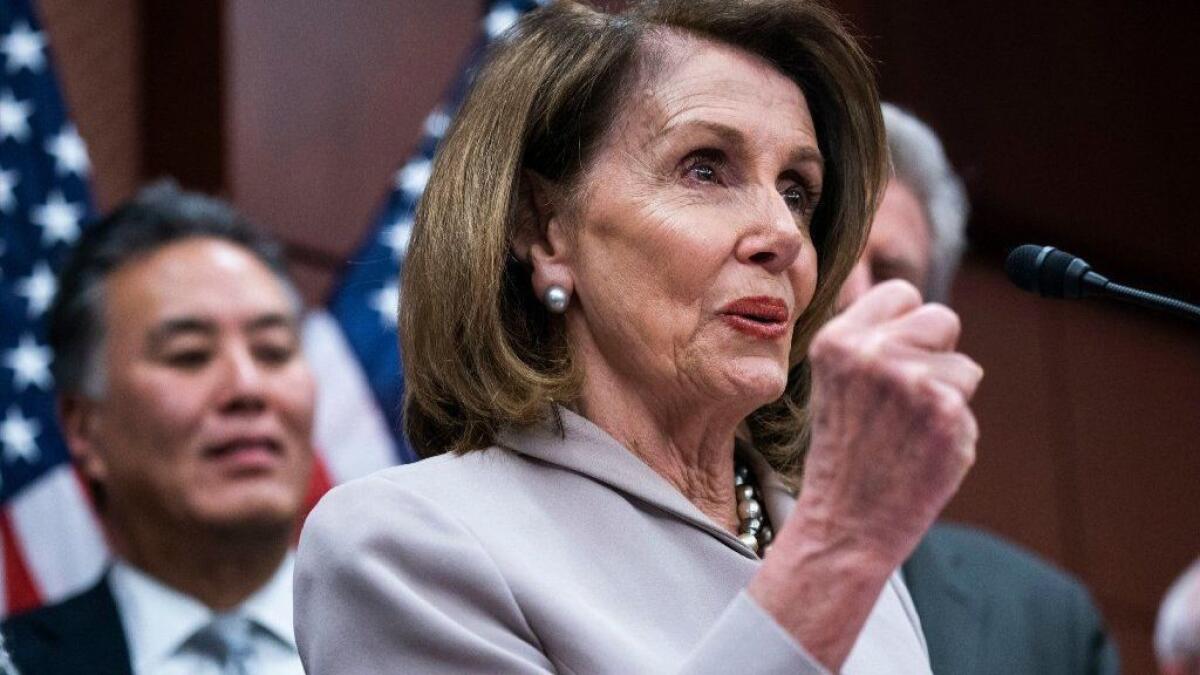Why Democrats shouldn’t impeach Trump — yet

- Share via
Reporting from Washington — In the wake of the redacted report from special counsel Robert S. Mueller III, Democrats were gripped by impeachment fever: Did Mueller’s findings demand that Congress launch formal proceedings to remove President Trump from office?
But the debate, while vigorous, already seems to be receding. The surprise wasn’t how many Democrats demanded impeachment, but how few.
Of 19 declared presidential candidates, only three insisted that impeachment begin now: Elizabeth Warren, Kamala Harris and Julian Castro. Even House progressives were divided; firebrand freshman Alexandria Ocasio Cortez of New York demanded action, but few joined her.
Instead, most House members are taking the advice of their speaker, Nancy Pelosi. The best course, she told them in a conference call Monday, is to take a deep breath, continue investigating Trump’s conduct on many fronts, build more public support — and defer the question of impeachment until later.
“We can investigate Trump without drafting articles [of impeachment],” Pelosi reportedly told her colleagues. “Let’s see where the facts take us.”
She’s right. There are several reasons launching impeachment proceedings now would be a bad move for Democrats.
Politics first. Polls show that most voters don’t want Congress to impeach Trump, although as many as two-thirds of Democrats favor the idea. Impeachment may be a winning issue in a Democratic presidential primary, but a potential loser in a general election.
If impeachment proceedings start, they’ll draw massive media attention — and that, too, would pose a danger for Democrats. Dramatic hearings over removing Trump could make it impossible for them to win attention to proposals on healthcare, education or any other issue.
That’s not only Pelosi’s view; it’s Bernie Sanders’, too.
“If for the next year and a half, going right into the heart of the election, all that the Congress is talking about is impeaching Trump, Trump, Trump, Trump … that works to Trump’s advantage,” the Vermont senator said Monday.
Even if the Democratic-run House votes to impeach the president, that merely sends the issue to the Senate, where the Republican majority would almost certainly reject it. Many voters would see a stillborn impeachment as a waste of congressional time — and Trump as a victim, if not a martyr.
An impeachment that dies in the Senate would allow the president to declare himself acquitted of all charges, much as he has claimed — falsely — that Mueller’s report gave him a “total exoneration.”
In the view of Pelosi and her advisors, a slower, more methodical approach is more likely to help turn Trump out of office.
An impeachment based solely on Mueller’s report would rest on only one solid charge: Trump’s attempts to obstruct investigations into his conduct.
Mueller found 10 episodes of potential obstruction, and Rep. Jerrold Nadler (D-N.Y.), chairman of the House Judiciary Committee, has said several appeared “impeachable.”
But at least six House committees are investigating issues Mueller didn’t touch — and those, too, could produce evidence for an impeachment inquiry.
Nadler’s Judiciary Committee is probing whether Trump broke campaign finance laws or misused his office for personal gain. Rep. Adam B. Schiff (D-Burbank), who heads the Intelligence Committee, is seeking information on Trump’s business ties to Russia. Rep. Maxine Waters (D-Los Angeles), chairwoman of the House Financial Services Committee, is looking into Trump’s other financial dealings — and so on.
In addition, federal and state prosecutors in New York have launched investigations into Trump’s real estate empire, his taxes, contributions to his inaugural committee, and the $280,000 paid to two alleged former mistresses.
If those inquiries turn up wrongdoing, an impeachment process would have more charges to consider — and public support for impeachment might grow.
Still, Warren and others have argued, there’s a question of principle here: Doesn’t the House have a constitutional duty to impeach the president?
“There is no political inconvenience exception to the United States Constitution,” Warren said at a televised forum on Monday.
That’s true. But the Constitution merely makes impeachment available to the House; it doesn’t require it.
Congress does have a duty to hold the president accountable for his actions, but impeachment is only one of several methods it can use. It’s an option, but not a goal in itself.
Democrats who hesitate to demand impeachment hearings aren’t shirking their duty or excusing Trump’s conduct. They might just be exercising prudent judgment — and focusing on effective action instead of symbolic gestures.
In any case, Pelosi isn’t ruling out impeachment as firmly as she did a month ago.
“If it is what we need to do to honor our responsibility to the Constitution — if that’s the place the facts take us — that’s the place we have to go,” she told her colleagues.
But she’s still saying the question should wait until more evidence is gathered.
That seems sensible. After more investigations, Americans will know better whether impeachment is warranted. Better to make that decision slowly and well, than fast but badly.
More to Read
Get the L.A. Times Politics newsletter
Deeply reported insights into legislation, politics and policy from Sacramento, Washington and beyond. In your inbox twice per week.
You may occasionally receive promotional content from the Los Angeles Times.











